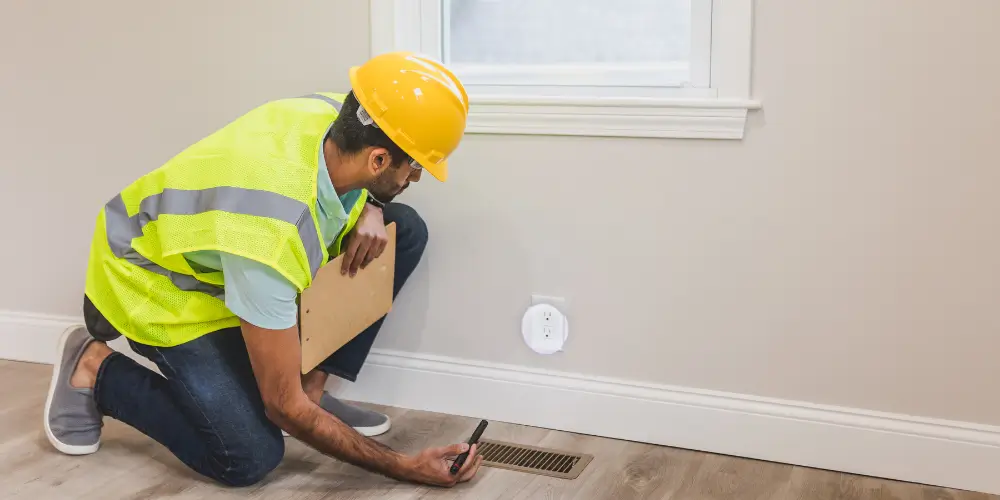The duration of an Electrical Installation Condition Report (EICR) for your home typically ranges from 2 to 8 hours, depending on the size and complexity of your electrical installations. For small homes, you’re looking at about 2-4 hours, while larger homes might need 6-8 hours. The process involves thoroughly examining your electrical systems, including wires, sockets, and protective devices, to assess wear and tear and guarantee compliance with safety standards. If your property has unique features or accessibility issues, it could take longer. To better understand how different factors influence the time required, keep exploring.
Key Takeaways
- An EICR check typically takes 1 to 4 hours for a domestic property.
- Small homes may require 1-4 hours, medium homes 4-6 hours, and large homes 6-8 hours.
- Factors like property accessibility and the complexity of electrical systems can affect the duration.
- Commercial properties generally take longer due to their scale and complexity.
- Regular inspections are mandated every 5 years for residential and commercial properties.
Table of Contents
How Long Does an EICR Check Typically Take?
An Electrical Installation Condition Report (EICR) typically takes 1 to 4 hours to complete for an average-sized domestic property. As you consider this essential safety measure, it’s imperative to understand the EICR process overview. Skilled inspectors thoroughly examine your electrical installations, evaluating wear and tear and guaranteeing compliance with current safety standards.
The significance of the EICR certification can’t be understated; it’s not merely a document but a proactive step in safeguarding your home against electrical hazards. The EICR report components include detailed findings on the condition of your wires, sockets, and protective devices, highlighting any deficiencies or deviations from the norm.
Regarding EICR inspector qualifications, only certified professionals with a deep understanding of electrical systems and safety regulations can perform these checks. This guarantees that the evaluations are accurate and that the advice you receive is reliable.
Don’t fall prey to common misconceptions that suggest these inspections are redundant if no immediate electrical issues are apparent; the underlying issues often go unnoticed until they evolve into major hazards.
A focus on EICR electrical safety is essential. The report identifies potential risks and guides you on corrective actions, aligning with EICR maintenance tips to enhance your system’s longevity.
Understand that EICR Cost factors vary and are influenced by your property’s size and the electrical system’s complexity. Remember, investing in an EICR is investing in your safety and peace of mind. You’re not just following a regulation but becoming part of a community committed to safety and diligence.

Factors Influencing the Length of an EICR Check
How long your EICR check takes can vary greatly depending on several key factors. Understanding these elements can help you prepare for the process and guarantee its smooth running.
Firstly, the inspection techniques employed play an essential role. Experienced technicians, utilising advanced methods and high-quality equipment, can greatly expedite the assessment while maintaining thoroughness. Your technician’s familiarity with the latest electrical standards is also crucial, as this knowledge can prevent time-consuming rechecks or corrections.
Property accessibility is another significant factor. Properties that are easy to navigate and where electrical systems are readily accessible will likely result in quicker checks. On the other hand, if your property has hard-to-reach areas or complex installations, more time will be needed.
The equipment used also impacts the duration of the check. Modern tools can diagnose issues more quickly than outdated models, which mightn’t be as efficient in detecting certain problems.
Moreover, the complexity of the report required can affect the timeframe. Detailed reports covering extensive systems or addressing numerous compliance issues will naturally take longer to compile than simpler ones.
Location factors also affect the time. Suppose your property is in an area difficult for technicians to reach or parking and access are problematic. In that case, this can add to the overall time.
How Long Is an EICR Check for Residential Properties?
Determining the duration of domestic EICR frequency typically depends on several specific aspects. The size of your home and the complexity of your electrical systems play key roles. Smaller homes only need a few hours, while larger properties require a whole day.
When planning your EICR, consider the essentials of the EICR checklist. This includes thoroughly assessing your wiring, protection devices, and electrical fixtures. Each element must meet current EICR safety standards, which guarantees your environment remains safe from electrical hazards.
The qualifications of the EICR technician are vital. You need someone licensed and with a deep understanding of EICR report interpretation. This expertise guarantees they can accurately identify potential issues and provide reliable maintenance tips.
Remember, a well-versed technician can perform the check more efficiently, potentially reducing the overall time.
EICR cost factors also weigh in. While you might be tempted to choose cheaper options, consider the long-term benefits of hiring a seasoned professional. They can help avoid the pitfalls covered under EICR’s common misconceptions, such as that newer homes don’t require checks as frequently.
Awareness of the importance of the EICR is significant. Regular checks aren’t just a regulatory formality but a fundamental aspect of home maintenance, safeguarding your property and family.
How Long Is an EICR Check for Commercial Properties?
Due to their larger scale and increased complexity, EICR checks for commercial properties generally require more time than those for residential sites. As you explore the EICR process overview, it’s vital to understand the unique commercial property requirements and the meticulous adherence to electrical safety standards necessary for your business’s safe operation.
How often should EICR be carried out on commercial property? The inspection frequency guidelines stipulate that commercial premises should undergo EICR every 3 to 5 years. However, this can vary based on your property’s usage and the impact of renovation, which might necessitate more frequent checks. The certification validity period is essential for guaranteeing ongoing compliance with safety standards, thereby protecting your property, employees, and customers.
Choosing qualified electricians to conduct these checks cannot be overstated. It’s not just about compliance; it’s about safeguarding the safety of your electrical installations in a way that fosters a sense of security and belonging among your staff and clients. Here’s a quick look at key aspects:
| Key Aspect | Details |
| EICR Process Overview | Extensive assessment of electrical systems |
| Commercial Property Req. | Tailored to business operations and building size |
| Electrical Safety Standards | Adherence to the latest regulations |
| Inspection Frequency | Every 3-5 years, can vary by property usage |
| Certification Validity | Guarantees compliance over a set period |
Understanding the EICR report interpretation is essential. It helps you grasp the present condition and future considerations for your property’s electrical safety. Engage with professionals who resonate with your mission to maintain a secure and compliant environment.

How Property Size Affects EICR Check Duration
Understanding the impact of property size on the duration of an EICR check is essential when planning for compliance and safety assessments. You should be aware that larger properties generally require more time due to increased EICR check complexity and the extensive nature of property electrical systems. The physical size dictates the number of circuits to inspect and the complexity of electrical layout considerations that your inspection team must navigate.
For instance, the inspection team’s experience is pivotal in extensive urban commercial properties. Experienced inspectors equipped with advanced testing equipment can more efficiently manage the intricacies of modern electrical systems, potentially reducing the time needed despite the larger area.
Conversely, older or rural properties might present unique challenges, such as outdated systems or accessibility issues, which can extend the duration of safety compliance checks. It’s important to take into account property age factors as well.
Older buildings often have undergone numerous modifications in urban or rural settings. These changes can complicate the electrical layout, requiring more thorough investigations and possibly more sophisticated testing equipment. Understanding your property’s electrical system’s specific requirements and potential hurdles becomes vital.
Joining a community or network focusing on property management and safety compliance could provide additional insights and support. Engaging with others who face similar challenges fosters a sense of belonging. It can offer practical solutions and shared experiences that help streamline your EICR process.
Common Delays During EICR Checks and How to Avoid Them
Several factors can lead to delays during an EICR check. Still, you can mitigate these issues effectively with proper planning and foresight.
Being part of a community that values safety and compliance, you understand the importance of a smooth EICR process. Here’s how you can prepare to guarantee the inspection runs without hitches:
Inspection Preparation
Guarantee that all areas of your property are accessible. Clear any obstructions that might prevent easy access to electrical systems. This not only speeds up the inspection but also guarantees a thorough check.
Documentation Readiness
Have all necessary documentation readily available. This includes previous EICR reports, any records of electrical work done, and schematics of your property’s electrical system.
Equipment Availability and Technician Experience
Confirm that your chosen technician has access to the required equipment and possesses the necessary experience. Experienced technicians can identify potential issues more quickly, and having the right tools on hand means they can test systems efficiently without unnecessary.
Scheduling and
Communication
Avoid scheduling conflicts by setting a clear appointment and confirming it a few days before. Guarantee there’s a straightforward communication channel established with your technician to address any immediate concerns that might arise before the inspection.
EICR Check Duration: What Homeowners Need to Know
Before scheduling your EICR check, it’s vital to understand how long the process might take. Primarily, the duration depends on your home’s size and the complexity of your electrical systems. As a homeowner, you’re likely keen to confirm that the EICR process is not only thorough but also efficient. Here’s a quick guide to help you estimate the time required:
| Home Size | Estimated Time | Common Factors |
| Small (1-2 beds) | 2-4 hours | Minimal electrical fittings |
| Medium (3-4 beds) | 4-6 hours | Standard complexity |
| Large (5+ beds) | 6-8 hours | High complexity |
Understanding these estimates helps you plan your day better and guarantees you’re not caught off guard. As part of your EICR preparation, it’s imperative to clear the areas around your electrical panel and sockets, which can help speed up the process.
The importance of the EICR cannot be overstated, it confirms the safety of your electrical installations and helps identify potential risks. By debunking EICR myths, such as the misconception that it’s an unnecessary expense, you begin to see the real benefits. These include compliance with safety standards, preventing electrical hazards, and potential savings on EICR costs through timely maintenance.
Always verify that EICR professionals conduct your check. Their expertise guarantees thorough inspection, EICR certification, and adherence to the latest safety regulations. Remember, a well-maintained home electrical system is safer and more efficient.
How Often Should EICR Checks Be Performed?
Determining the frequency of EICR checks depends largely on various factors, including the type of property you own and its usage. Staying compliant guarantees safety and fosters a sense of community and responsibility. Here’s how often you should conduct these inspections:
- Residential Properties: For homeowners, EICR frequency guidelines recommend testing at least every 5 years. However, if you’re a landlord, the requirements tighten. You need to confirm an EICR check every five years or upon a change of tenancy. This is essential to meet residential property requirements and maintain the trust and safety of your tenants.
- Commercial Properties: The standards for commercial properties are more stringent. Periodic inspection intervals are generally set at every 5 years. Considering the high usage of electrical systems in commercial settings, this frequency helps mitigate any risks associated with electrical failures.
- Understanding Responsibilities: It’s important to grasp both landlord responsibilities and tenant obligations. Landlords must arrange for periodic checks and address any faults promptly. Tenants should report any electrical issues they encounter. Together, this cooperation enhances the significance of electrical safety.
- Consequences of Non-Compliance: Ignoring these guidelines can lead to severe consequences. Potential penalties explained include hefty fines and legal actions. More critically, it puts the safety of the occupants at risk, which could have far-reaching consequences beyond just legal troubles.
Adhering to these guidelines guarantees that everyone in the property—from owners to tenants—feels secure and valued, reinforcing the community bond through a commitment to safety.

Legal Requirements and Compliance
Understanding the legal requirements and compliance for Electrical Installation Condition Reports (EICR) is vital in maintaining the safety and integrity of your property’s electrical systems. As you navigate these waters, you must familiarise yourself with the specific EICR regulations and compliance standards that govern your obligations.
Firstly, EICR is mandated by law under various housing and electrical safety standards, especially if you’re a landlord. This isn’t just about ticking a box; it’s about ensuring that you, as a property owner, uphold your legal obligations and safeguard your tenants. Failing to comply can lead to significant legal consequences, including fines and invalidated insurance policies.
Landlord responsibilities extend beyond mere compliance. You must ensure that all safety inspections are conducted at regular intervals—typically every five years or at each change of occupancy, whichever comes first. This regular scrutiny isn’t arbitrary; it prevents potential electrical hazards that could endanger lives.
Moreover, the certification process isn’t to be taken lightly. Can any electrician do an EICR: A qualified electrician must carry out the EICR to assess and document the condition of your electrical installations. This process verifies that your installations meet current electrical safety standards, a non-negotiable aspect of tenant rights and property management.
Tips for Faster EICR Approval
To expedite EICR approval, verify that your electrical systems are well-maintained and fully compliant before the inspection.
Keeping ahead of potential issues guarantees the safety and integrity of your electrical installations. It streamlines the inspection process, saving you time and money.
Here’s how you can achieve quicker EICR approvals:
- Choose Qualified Electricians: Make sure the electrician conducting your EICR isn’t only certified but experienced in your type of property. Experienced professionals understand electrical safety nuances and are adept at identifying potential compliance issues, making the inspection process smoother.
- Efficient Scheduling Strategies: Coordinate the inspection at a time that causes minimal disruption to your regular operations. If you’re managing a rental property, communicate effectively with your tenants to find a suitable time. This avoids delays and guarantees that the inspector has unimpeded access to all necessary areas.
- Essential Documentation Checklist: Prepare all relevant documents beforehand. This includes previous EICR reports, details of any remedial work completed since the last inspection, and schematics of your electrical system. Having this information readily available can notably cut down on inspection time.
- Streamlining Inspection Processes: Regular maintenance checks and addressing issues as they arise can prevent a backlog of problems during the EICR. Implement a system where issues are logged and addressed promptly, guaranteeing your electrical systems are always at their best.
Frequently Asked Questions
Can I Be Present During the EICR Check?
Yes, you can be present during the EICR check. Engaging with the inspector enhances your understanding of the process, ensures you meet responsibilities and safety precautions, and clarifies misconceptions about the EICR report expectations.
What Qualifications Should an EICR Inspector Have?
You’ll want an EICR inspector with robust EICR training requirements, proper certification, and ample experience. They should also be up-to-date with regulatory standards and skilled in using inspection tools and interpreting reports accurately.
Are Temporary Power Outages Necessary During an EICR Check?
Temporary disconnections are often necessary for safety protocols when manoeuvring the maze of electrical systems. You’ll need to guarantee property access and adapt schedules for the inspection’s thoroughness, safeguarding your home with precise testing equipment and findings.
Can Weather Conditions Affect the Timing of an EICR Check?
Yes, weather conditions can indeed affect your EICR check. Outdoor conditions, especially rain, humidity levels, and temperature effects can cause inspection delays due to safety precautions and the impact on equipment performance.
Is There a Difference in EICR Check Duration Between Old and New Properties?
As the adage goes, “Time reveals all things,” and the duration of the EICR inspection varies. Older properties generally require longer due to complex wiring assessments, intricate electrical systems, and thorough report generation, impacting your schedule considerably.


